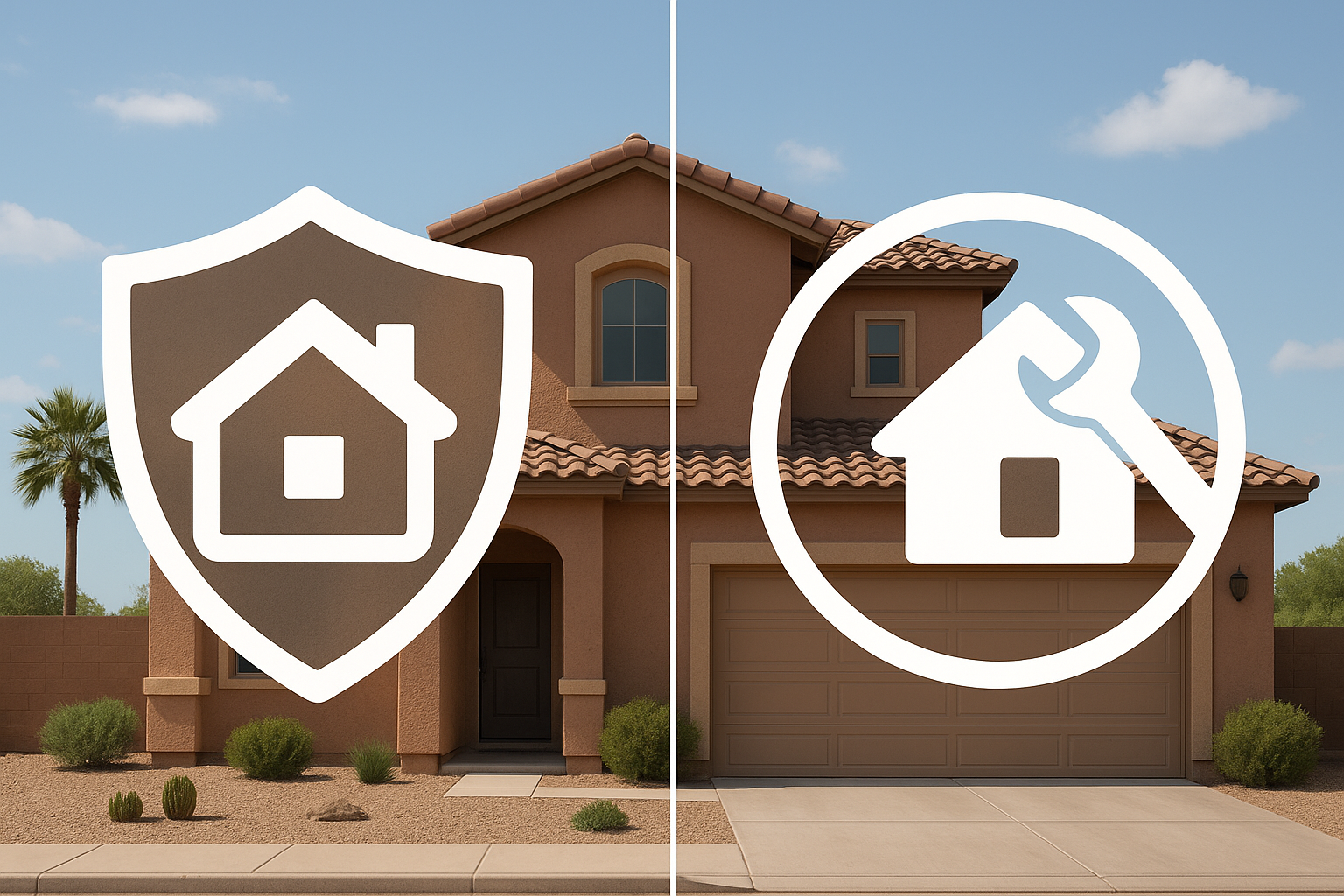Home Warranties vs. Home Insurance – What's Covered, What's Not
As homeowners in metro Phoenix, you've likely heard both terms thrown around during your home buying process and throughout your homeownership journey: home warranty and home insurance. While they might sound similar, these two types of coverage serve completely different purposes, and understanding the distinction can save you thousands of dollars and significant stress when something goes wrong.
Many homeowners assume their insurance policy covers everything, only to discover—usually at the worst possible moment—that their claim has been denied. Others pay for home warranties without truly understanding what protection they're actually receiving. Our team works with homeowners throughout the Phoenix metro area every day, and we've seen firsthand how confusion about these two products can lead to expensive surprises.
Let's clear up the confusion once and for all.
Understanding Home Insurance: Protection Against the Unexpected
Home insurance, also called homeowners insurance, is designed to protect you from sudden, unexpected disasters and catastrophic events. Think of it as your financial safety net for things you couldn't predict or prevent—the "what if" scenarios that keep homeowners awake at night.
What Home Insurance Typically Covers
Dwelling Coverage: This is the foundation of your policy. It covers the physical structure of your home if it's damaged or destroyed by covered perils like fire, lightning, windstorms, hail, or vandalism. In the Phoenix area, where monsoon storms can cause significant damage, this coverage becomes especially important when high winds rip off roof tiles or debris damages your home's exterior.
Personal Property: Your belongings inside the home—furniture, electronics, clothing, appliances—are typically covered if they're damaged or stolen due to a covered event. If a fire damages your home, your insurance doesn't just cover rebuilding the structure; it also helps replace what you've lost inside.
Liability Protection: This crucial component protects you financially if someone is injured on your property or if you accidentally cause damage to someone else's property. If a guest slips on your pool deck and requires medical treatment, your liability coverage helps pay for their medical bills and legal fees if they decide to sue.
Additional Living Expenses: If your home becomes uninhabitable due to a covered loss, your insurance policy typically pays for temporary housing, meals, and other living expenses while your home is being repaired. This can be a lifesaver for Phoenix homeowners whose homes are severely damaged by fire or other disasters.
Other Structures: That detached garage, pool house, or storage shed in your backyard? They're usually covered too, typically up to 10% of your dwelling coverage amount.
What Home Insurance Does NOT Cover
Here's where many homeowners get frustrated. Home insurance has significant exclusions, and understanding these gaps is critical:
Normal Wear and Tear: If your water heater simply reaches the end of its lifespan and stops working, that's not covered. Insurance doesn't pay for things that break down due to age or lack of maintenance.
Maintenance Issues: If your roof has been deteriorating for years and finally starts leaking, don't expect your insurance to cover it. Damage resulting from poor maintenance or neglect is excluded from coverage.
Mechanical Breakdowns: When your air conditioning system stops working on a 115-degree Phoenix summer day because of mechanical failure—not because a monsoon storm damaged it—your insurance policy won't help.
Pest Damage: Termites, rodents, and other pests? You're on your own. Insurance policies specifically exclude damage caused by infestations.
Certain Natural Disasters: Standard policies typically don't cover floods or earthquakes. In Arizona, we're fortunate that earthquake risk is relatively low, but flood coverage requires a separate policy, which can be important for homes in certain areas of metro Phoenix.
Intentional Damage: If you or someone in your household deliberately damages the property, insurance won't cover it.
Understanding Home Warranties: Your Appliance and System Safety Net
A home warranty is fundamentally different from insurance. It's actually a service contract that covers the repair or replacement of major home systems and appliances when they break down due to normal wear and tear. Think of it as an extended warranty on the mechanical components of your home.
What Home Warranties Typically Cover
HVAC Systems: Your heating and air conditioning systems are usually covered, including components like the compressor, condenser, and evaporator coils. For Phoenix homeowners, this can be invaluable given how much we depend on our AC systems.
Plumbing Systems: Covered items typically include water heaters, plumbing stoppages, leaks in plumbing lines, and various plumbing fixtures like faucets and toilets.
Electrical Systems: The electrical panels, wiring, switches, and outlets in your home are generally covered under most home warranty plans.
Kitchen Appliances: Your refrigerator, dishwasher, oven, range, built-in microwave, and garbage disposal are typically included in coverage.
Laundry Appliances: Washers and dryers are commonly covered items.
Other Systems: Depending on your plan level, you might also have coverage for garage door openers, ceiling fans, water softeners (particularly relevant in Arizona with our hard water), and pool/spa equipment.
What Home Warranties Do NOT Cover
Home warranties have their own set of limitations that every homeowner should understand:
Pre-Existing Conditions: If something was already broken before you purchased the warranty, it won't be covered. This is why home warranty companies often have waiting periods for coverage to begin.
Improper Installation or Maintenance: If a system or appliance fails because it wasn't installed correctly or wasn't properly maintained, your claim may be denied.
Code Upgrades: If repairs require bringing your home up to current building codes, the warranty typically covers only the cost of the basic repair, not the additional expense of code compliance.
Cosmetic Issues: If your refrigerator has a dent but works perfectly, the warranty won't pay to fix the cosmetic damage.
Known or Recalled Issues: Manufacturer defects or recalled items are typically excluded from coverage.
Items Outside the Contract: If you have basic coverage and didn't add the pool equipment rider, your pool pump isn't covered. Always read your contract carefully to know exactly what's included.
Capacity Limits: Warranties often have caps on coverage amounts per item or per year, which means if your repair costs more than the limit, you'll pay the difference.
Cost Comparison and Value Consideration
Understanding the financial investment for each type of coverage helps you make informed decisions about your home protection strategy.
Home Insurance Costs: In metro Phoenix, annual premiums typically range from $1,200 to $2,500 or more, depending on your home's value, location, coverage limits, and deductible. This is typically required by your mortgage lender and is non-negotiable if you have a loan.
Home Warranty Costs: Annual home warranty contracts in Arizona generally cost between $350 and $800, depending on coverage level and add-ons. You'll also pay a service call fee (typically $75-$125) each time you request service.
The value of a home warranty largely depends on the age and condition of your home's systems and appliances. If you have newer equipment still under manufacturer warranties, a home warranty might be redundant. However, if your home has aging systems, particularly HVAC equipment older than 7-10 years, a warranty can provide peace of mind and budget predictability.
Making the Right Choice for Your Phoenix Home
Here's what we recommend to homeowners in metro Phoenix:
Home Insurance is Non-Negotiable: You absolutely need homeowners insurance. Beyond being required by your lender, it protects your most valuable asset from catastrophic financial loss. The question isn't whether to have it, but rather ensuring you have adequate coverage with appropriate limits and deductibles.
Home Warranties Are Optional But Require Commitment: Here's our honest assessment—home warranties can be valuable, but they're not for everyone. These contracts are complex, and if you're not willing to invest time understanding them, you're better off skipping the warranty altogether.
Home warranties work best for homeowners who are:
Willing to read and understand the fine print: You need to know exactly what's covered, what's excluded, and what the limitations are before you ever need to file a claim.
Organized with documentation: Keep maintenance records, understand the claims process, and know how to communicate effectively with warranty representatives.
Proactive about asking questions: If something in your contract isn't clear, call and get clarification before you need service. Don't wait until your AC breaks to learn what's actually covered.
If you're not someone who reads contracts carefully, keeps organized records, or feels comfortable navigating customer service processes, a home warranty will likely frustrate you more than help you. You'll pay for service calls, wait for technicians, and then feel disappointed when you discover limitations you didn't understand. That's money wasted on a product you're not positioned to use effectively.
However, if you're detail-oriented and have aging systems—particularly HVAC equipment in our extreme Phoenix heat—a warranty can provide valuable budget protection. Just know it requires active management on your part.
Tips for Maximizing Your Coverage
Whether you choose to invest in a home warranty or not, here are strategies to protect yourself:
For Home Insurance:
Review your policy annually to ensure coverage limits match your home's current replacement value
Document your belongings with photos or video for easier claims processing
Understand your deductible and ensure you could afford to pay it if needed
Consider additional coverage for high-value items like jewelry or art
Keep up with home maintenance to avoid claim denials
For Home Warranties:
Read the fine print before purchasing—know exactly what's covered and what isn't
Keep records of all maintenance performed on covered systems
File claims promptly when issues arise
Understand the claims process and expected timelines
Budget for service fees and potential coverage gaps
The Bottom Line
Home warranties and home insurance serve completely different purposes. Here's what you need to remember:
Home Insurance: Required protection against catastrophic events like fires, storms, theft, and liability claims—covers the "what ifs"
Home Warranty: Optional protection for system and appliance breakdowns from normal wear and tear—covers the "when it happens"
They don't overlap: Insurance won't cover your aging AC system, and warranties won't cover storm damage
Both have value: Insurance is non-negotiable; warranties are only worthwhile if you'll actively manage them
Understanding what you're actually paying for allows you to make informed decisions about the coverage that makes sense for your home and budget.
Your Real Estate Resource
As your local real estate team, we're committed to helping homeowners throughout metro Phoenix navigate not just the buying and selling process, but every aspect of successful homeownership. Understanding your home protection options is just one piece of the puzzle, but it's an important one that can save you significant money and stress over the years.
Whether you're preparing to buy, planning to sell, or simply want to make the most of your current home, we're here to provide the education and guidance you need. For all your real estate needs, I'm a call away: Schedule Your Free Discovery Call




